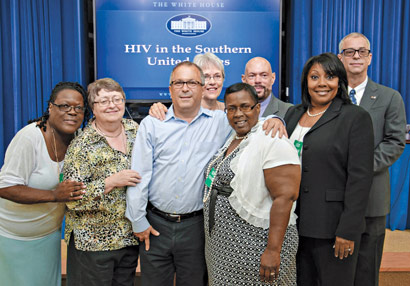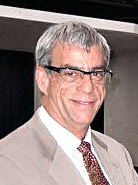 |
| From left: Southern HIV/AIDS Strategy Initiative (SASI) members Esther Ross, Kathie Hiers, Robert Greenwald, Carolyn McAllaster, Deadra Malloy, Joseph Interrante, Linda Rigsby and Robin Webb at the 2014 White House Meeting on HIV in the Southern United States |
In addition to his advocacy in Mississippi, Webb also is a member of two groups that work on the big topics facing the region as a whole. They are the Southern AIDS Strategy Initiative (SASI) and the Southern AIDS Coalition (SAC).
Webb shares his thoughts about the ongoing work of SASI and SAC, as well as his hopes for progress on breaking through the myriad barriers to improving HIV/AIDS care and treatment in the South. He also shares his love of music.
About 10,000 people in Mississippi are estimated to be living with the virus, but only about half of them are on treatment. Is this still the case?
Yes. The 10,000 figure comes from adding the estimated 20 percent of folks on a national average that have never been tested. So officially we have about 8,700 that are identified as living with HIV. From our health department, those in sustainable care are less than 50 percent.
“Sustainable” is the key word there: We have many people who’ve never had HIV care. We have an extraordinary number of people who show up in hospitals with pneumonia and who have never been tested for HIV.
One of the reasons for people not knowing their status is they don’t trust those who are doing the testing here. We have a history of doing punitive testing, a process that drags people into the ground.
To be clear, we’ve really cleaned a lot of this up. But years ago, the state would come after you. It would issue warnings about procreating, it would make you sign forms, and it would do investigations. They would act as though it was a crime to be HIV positive.
Progress on this front has been made to the credit of our health department, but also to people living with the virus. We told state officials that it was very bad public health policy to conduct negative-experience-type testing.
Other factors that contribute to our epidemic include poverty and illiteracy, as well as stigma and discrimination. People of low income lack resources—when we talk about googling something, that’s a luxury for some folks.
The information they do encounter in the Mississippi Delta and other similar places in the South about HIV/AIDS is overwhelmingly inaccurate. Sometimes there are exceptions.
Such as the organization you founded and still lead, A Brave New Day. Tell us about it and how it started.
I grew up in Mississippi but moved to New York City for about 20 years. After my HIV-positive diagnosis, I moved back to Mississippi after my partner died, which was more than a decade ago. There was nothing in the way of support, so I called my New York friends from Housing Works and other groups.
We got started by formulating a nonprofit that would then create an HIV-positive, peer-driven support agency. Through the Ford Foundation and AIDS United, we then created an annual empowerment conference, which included a legislative day at the state capitol where people could meet legislators and other officials.
Eventually, we got hundreds of people who had never done anything proactive about their HIV status other than going to the doctor. The conference became a lifeline for three or four days where people could get self-care training and policy training. I believe it began the HIV/AIDS empowerment movement in Mississippi.
A Brave New Day has transformed into an online-only community for now. That said, we hope to continue the conference and provide support for several different kinds of meetings.
What really drove the group and me to where we are today is tying in civil rights with HIV/AIDS human rights. I grew up in Ruleville when civil rights activist Fannie Lou Hamer was in her heyday. She also was from Ruleville.
Our conference has always been dedicated to Hamer. Her famous words were, “I’m sick and tired of being sick and tired.” HIV/AIDS survivors understand her words from a new perspective.
What else is your organization doing?
In addition to continuing the conference in the future, our next goal is to address the problems of people living with HIV/AIDS in rural Mississippi. Isolation and the absence of peer support are huge issues.
One might think now is the time for online interventions—and it is. But as I mentioned before, online access is a barrier. I did a nonscientific survey of several hundred people living in rural Mississippi, and over two-thirds of them said they were not plugged in: They didn’t use computers and cell phones; they weren’t on social media.
 |
| Robin Webb |
SAC is a combination of government agencies, community-based organizations and people living with HIV, as well as pharmaceutical partners on an advisory level. We do policy work, we travel to Washington, DC, and we do state watches to find out what’s happening in each state.
SASI is its own group, kind of a sister organization, focused on research and policy, especially research that leads to effective policy.
As far as the areas of concern go, they include stigma, housing and addiction. For stigma, we’re concerned about it not only in the general population, but also stigma within the service provider population and internalized stigma among folks living with HIV.
For housing, we’re rethinking the proper formularies to get more federal Housing Opportunities for Persons with AIDS (HOPWA) dollars to come to the South. Take someone like myself, for instance: I’m still counted as a statistic in New York City.
We understand there are conflicted opinions on this around the country. Our motivation is not to take dollars out of anywhere else, but to find new or redistributed dollars.
The biggest elephant in the room is addiction. In many places in the Deep South, addiction services are simply nonexistent. If they do exist, they’re not comprehensive. Also, the drugs people use are different here. We don’t have as much of a heroin and shared-needles problem as we do recreational use of crystal meth and crack.
How did you get involved in HIV work?
I was diagnosed with the virus in Manhattan in 1988, but I probably had it for years before. One thing that kept many of us alive was embracing just surviving as a full-time job.
I got involved with HIV professionally to live. I used to joke about it, saying the “New York, New York” song lyrics—“If I can make it there, I’ll make it anywhere”—were a crock. I thought it was much more accurate to say “there” was Mississippi.
I struggled with depression, and it took a long time to get past it, which I have. Sheer survival was my driver for starting this agency.
What are the lessons you’ve learned as a long-term survivor?
Medication is not enough to keep you alive. If we don’t take a comprehensive approach to our health and well-being, the real killers creep up on you: depression, addiction, isolation, losing your finances, losing a roof over your head.
A holistic approach is critical. Case in point: I have a PhD in music, and I’m a concert pianist and a jazz pianist, and I hadn’t played a note in years because I got so immersed in advocacy. Now I’m back into music, and it’s great.
I think all the time about younger folks. I don’t want them to go through what I went through. There’s more work to do to make that happen. So that keeps me going, and music keeps me going.
I’ve found a balance between advocacy, embracing my medical challenges and rediscovering my passions.






3 Comments
3 Comments